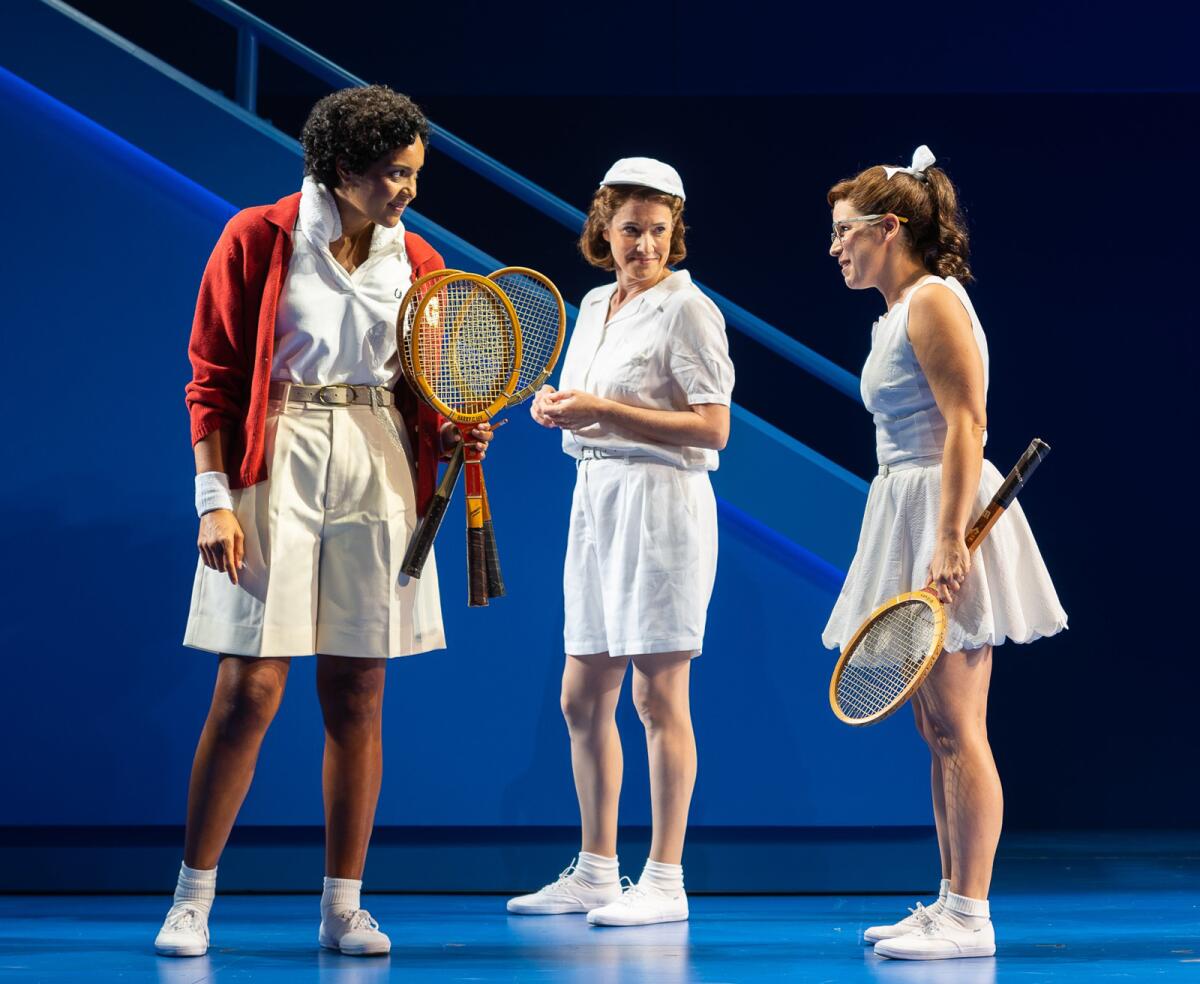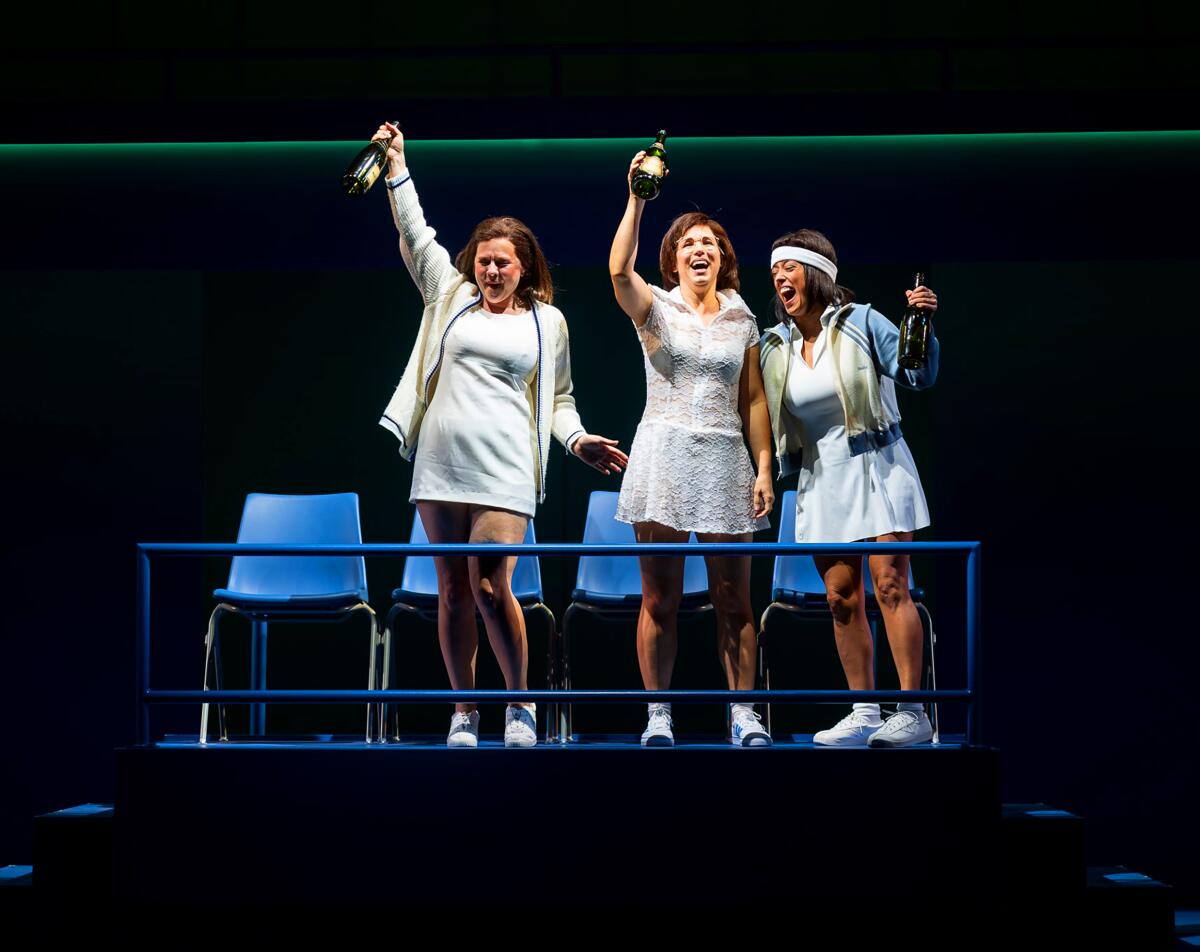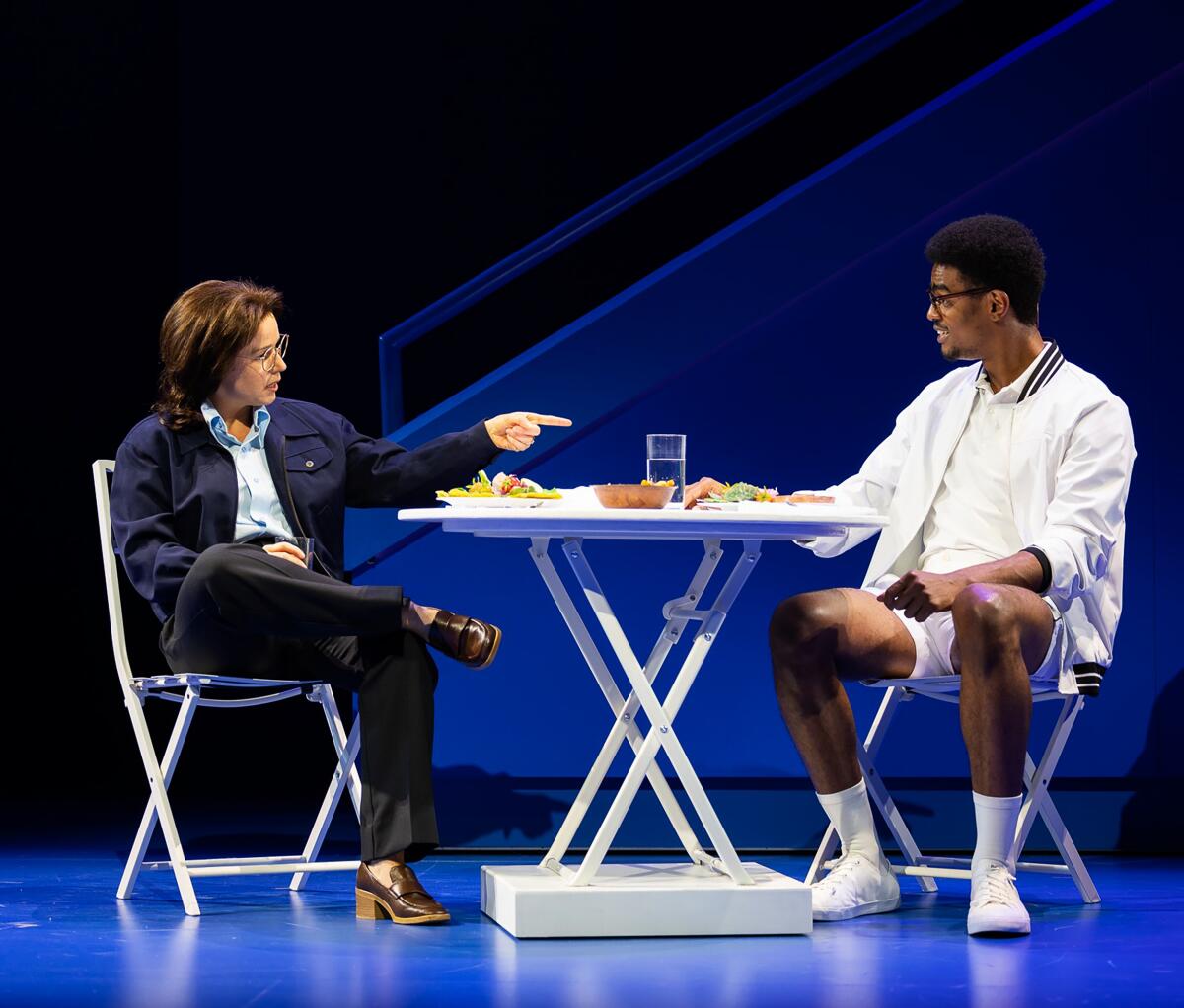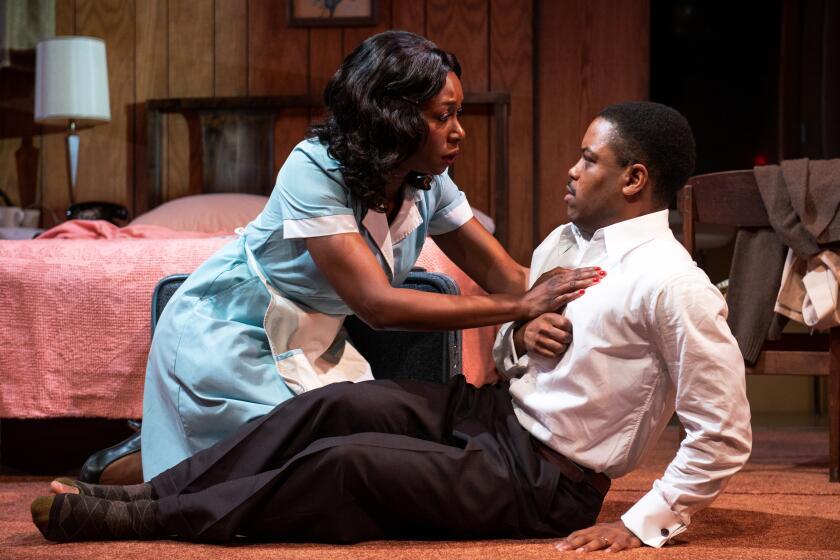A new play that traces Billie Jean King’s inspiring story ought to be a musical

- Share via
“Love All,” a new play by Anna Deavere Smith, tackles the path-blazing life of Billie Jean King, tennis champion, equality crusader and real-life superhero.
An actor and playwright renowned for her documentary dramas (“Fires in the Mirror,” “Twilight: Los Angeles, 1992”) on divisive subjects, Smith departs from her usual practice of arranging verbatim testimony into dialectical collages. “Love All,” which is having its world premiere at La Jolla Playhouse in a production directed by Marc Bruni, offers a more straightforward dramatization of King’s story.
A fireman’s daughter from Long Beach, Calif., Billie Jean picks up the game on public courts and vows that she will one day be No. 1 in the world. She makes an early splash at Wimbledon, knocking out No. 1 seed Margaret Smith and reaching the quarterfinals — a foreshadowing of the record 20 Wimbledon championships she will compile in singles, doubles and mixed doubles before she retires.
Billie Jean’s identity struggle — she is married to a man yet romantically drawn to women — is sensitively handled. The marriage to Larry King (John Kroft) is treated with mutual dignity and genuine affection. But the main order of dramatic business is a champion’s quest to establish a separate women’s tour that can better compete for a fair share of the game’s prize money, media attention and endorsement deals.
Carefully researched, the play offers a series of biographical snapshots, set against the background of cultural and political watersheds of the tumultuous 1960s and early 1970s. The times are changing, and Billie Jean (impressively played by Chilina Kennedy, with just the right 1970s hairstyles) is galvanized by the rapidly shifting horizon of possibility. It’s an inspiring story of a gifted athlete’s heroics on and off the court, but the summary nature of so much material sometimes lends the impression of a theatricalized book report.
As a hard-core tennis fan, I was enthralled when, rackets in hand, Rosie Casals (Elena Hurst) and Frankie Durr (Lenne Klingaman) arrived with their competitive grit, locker room camaraderie and unflagging commitment to Billie Jean’s cause of placing professional women’s tennis on equal footing with the men’s game. But as a theater critic, I couldn’t shake the nagging feeling that “Love All” is meant to be a musical.

Smith may not realize it yet but she has written the book for a future Elton John show. John is the obvious choice not only because he wrote the song “Philadelphia Freedom” for King, his longtime friend, but also because his up-tempo rock is a perfect fit for the unstoppable force that is this tennis playing freedom fighter.
“A Man’s life of any worth is a continual allegory,” observed the poet John Keats. As someone who exemplifies this truth more completely than most, King throws into relief the male bias of the wording.
The play begins with Billie Jean delivering a speech in a 1973 Senate hearing on Title IX, the groundbreaking legislation that protects against discrimination based on sex in educational programs that receive federal funding. Yielding a multitude of breakthroughs in the fight for equality, the law opened the door to athletic opportunities for girls and women in school and universities.
“I think we have to change,” Billie Jean says during the hearing. “That is the one thing I tried to make happen ever since I was 11 years old. I wanted to change tennis.”
“Love All” then travels back in time to when young Billie Jean Moffitt is being criticized for not wearing a skirt. Growing up in a blue-collar family in the 1950s, she was made to feel like an outsider in an elitist sport that was still the preserve of well-to-do white people in all-white outfits at exclusively white country clubs.
Eyeing the promise of this spirited junior, Alice Marble (Bianca Amato), winner of five Grand Slam singles titles, helps mold her into a champion. Althea Gibson (Rebecca S’Manga Frank), the first Black tennis player to win a Grand Slam (five of them in singles by the end of her career), inspires Billie Jean, showing her that the impossible is indeed reachable.

Margaret Court (Allison Spratt Pearce), née Smith, the tall and powerful Australian with a gigantic wingspan at net, becomes Billie Jean’s chief rival on the court — and a significant obstacle off it. The play elides Court’s winning record over King. But the differences between the two women are well handled. Conservative by nature and deeply religious, Smith resisted the rallying cries for gender equality of her more liberated opponent and has made headlines in recent years for homophobic comments.
Not everyone will be fascinated by the shifting rules about amateurs and professionals and its impact on the economics of the game. The greed of contemporary sports has to be set aside to understand the civil rights issue at stake in King’s long campaign for equal prize money — a campaign still being waged today. (In fact, there has been quite a bit of backsliding on the tour since the pandemic wreaked havoc on attendance.)
The shape of Smith’s drama is uncertain. It’s never a good sign when an intermission surprises an audience. More problematic is the diagrammatic nature of the storytelling. If you want an introductory outline with compassionate politics, “Love All” is your play. But if you’re looking for subtlety, you will find it chiefly in the treatment of King’s personal story.
Adultery and abortion are handled with as much candor as care. Sexuality and its expression are seen in light of the repressiveness of the age. Billie Jean worries that her groundbreaking independence will inflict tremendous pain on her traditional parents and wound her supportive husband.
In the thick of the spotlight, awash in the glory of the winner’s circle, Billie Jean can seem at moments like the loneliest person in the world in Kennedy’s multi-hued performance. “Love All” is at its best when confronting the gap between public and private selves.
The tennis matches are handled smartly, in theatrical shorthand, supplemented with brief video projection. (I would have been happy to watch whole sets.) The relationships on tour are deeply affecting because they illuminate Billie Jean’s communal nature.
Anna Deavere Smith revisits ‘Twilight: Los Angeles, 1992’
The collective is never obscured by personal ambition. Her friendships in the locker room mean at least as much to her as her trophies. When Arthur Ashe rejects her appeal to support the cause of the women’s player, she is aggrieved. Isn’t equality their shared goal? The play doesn’t allow Billie Jean’s disappointment to infringe on Ashe’s important historical legacy, but it shows what women were up against.
The story of the Original Nine, the renegade group led by King to start an alternative women’s circuit, is stirringly recapped. Smith’s political understanding is exemplary throughout. If only her playwriting were as finely tuned.
The scenic design by Robert Brill, containing the action in an abstract stadium, allows for a smooth and speedy Shakespearean flow of scenes. Brisk and efficient, the staging doesn’t venture all that much below the surface of the story.
The play seems on an inexorable course toward the televised “Battle of the Sexes” match between King and Bobby Riggs, but Smith perhaps wisely opts to pass over an event that has already received so much attention. In a somewhat abrupt leap at the end, Billie Jean’s sterling tale is brought up to date by her beaming spouse, Ilana Kloss (Amato).
Tennis is my first love; theater is a close second. “Love All” might be better appreciated by more casual fans who won’t see the title and think zero-zero. But the play may be signaling that this is just the starting point for a dazzling musical about one of sport’s true game-changers.
'Love All'
Where: Mandell Weiss Theatre, La Jolla Playhouse, 2910 La Jolla Village Drive, La Jolla
When: 7:30 p.m. Tuesdays-Wednesdays, 8 p.m. Thursdays-Fridays, 2 and 8 p.m Saturdays, 2 and 7 p.m. Sundays. Ends July 2
Tickets: Start at $25
Contact: LaJollaPlayhouse.org; (858) 550-1010
Running time: 2 hours, 30 minutes
Katori Hall’s two-person drama ‘The Mountaintop’ opens at the Geffen Playhouse.
More to Read
The biggest entertainment stories
Get our big stories about Hollywood, film, television, music, arts, culture and more right in your inbox as soon as they publish.
You may occasionally receive promotional content from the Los Angeles Times.












